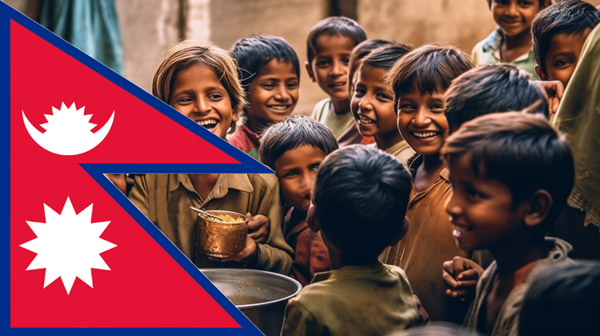Overcoming Prejudice to Reach Street Children in Nepal
Nepal has a new “secular government” and Hindu social structure that makes it impossible for most western and christian organizations to operate there. Despite these challenges, Dawas Ministries is moving forward with understanding and compassion to minister to street children in need.
The Caste System, Reincarnation, and Karma
Nepal is a religiously controversial land, perhaps second only to the Middle East. Nepal is recognized as the birthplace of Siddhartha Gautama, the Buddha. Yet, as of 2023, 81.3% of the population of Nepal considers themselves Hindu. These Hindu roots date back thousands of years. Hindu philosophies such as Reincarnation, Karma, and the Caste System are ingrained in the social structure.
Most westerners are familiar with the concepts of reincarnation and karma. Reincarnation being the belief that a person’s soul or spirit leaves the body upon death and takes a new body – human, animal, even insect. Karma being a belief that every person will be responsible for their actions – that everyone receives what they deserve. In Nepal, nearly every person is also impacted by the caste system. The Hindu Caste system primarily comes from the Rig Veda, an ancient Hindu text that describes a primordial being, Brahma (or Purusha), divided into four parts. These four parts correspond to caste, or groupings of people, based on their birth and social role:
- Brahmins (head) – priests and teachers
- Kshatriyas (shoulder) – warriors and rulers
- Vaishyas (leg) – farmers, traders & merchants
- Shudras (foot) – laborers
However, there is also a fifth group: Dalits, also known as “the caste-less” or “untouchables”. Those born as Dalits, are often thought of as those who do not belong and are being punished for bad karma from a past life. They are associated with dirty or refuse jobs such as cleaning toilets or sweeping streets and it isn’t uncommon for higher caste members; Brahmins or Kshatriyas, to consider being touched or served by a Dalit as an insult or contamination. This “Caste Discrimination” combined with beliefs of having “bad karma” or receiving punishment for past actions can cultivate a very dark side of Nepalese culture.
For example, children who are homeless and living on the streets are often viewed as “filthy” or “wicked” people who are receiving what they deserve. People who are in poverty and never had an opportunity to receive an education are often led to believe that such circumstances are their proper role in life. In some cases, even simple acts of meeting the basic needs of street children by giving them food and an opportunity to receive an education has been perceived as “disrupting the religious sentiment” or even “using funds to proselytize children”. When twisted this way, the Constitution of Nepal could criminalize meeting needs of or caring for street children!
Nepal’s New “Secular Government”
This level of discrimination and prejudice certainly can’t be blamed on all Hindu beliefs. However, traditions of discrimination stretching back hundreds and thousands of years are not easily weeded out. In 2008, Nepal formed a new “Secular Government” striving towards democratic socialism and began implementing many policies for equality. In 2011, it became illegal in Nepal to discriminate against any person based on caste, race, or descent. Despite efforts and strides to create equality, traditions of discrimination are often more easily redirected than eradicated.
We celebrate the Nepalese government for their progress in fighting such discrimination. However, we are also concerned about how contradictions and loop-holes in recent policies are now being used to discriminate against those who “sympathize with western beliefs” and Christians. For example, those exact phrases used by radicals; “disrupting the religious sentiment” and “using funds to proselytize”, appear in the new “secular government’s” constitution. And, while Hindu, Buddhist, and Muslim organizations are allowed to register schools in Nepal, Christian organizations are not allowed to. We hope and pray for the wise leadership and judiciary system of Nepal to recognize and take action against these kinds of discrimination.
How Dawas Ministries is Overcoming Prejudices
Dawas Ministries recognizes and honors the laws of Nepal and takes extra measures to ensure that we remain above reproach in our intentions and conduct while meeting the basic needs of street children and families. While it is impossible for us to hide that we are motivated by the love of Jesus Christ, we take extra care not to proselytize, cause anyone to feel as if they are forced to become a Christian, or that they can only receive food or benefits by doing so. Instead of creating schools, we provide basic skill training that allows anyone to learn a trade or receive basic education for a hope of earning income for themselves. We also avoid hot-button behaviors such as purchasing property, publicly displaying any “Christian” imagery, or exporting currency or funds. We happily comply with all of these practices for the opportunity to simply provide food and meet the basic needs of even one more Nepalese street child.
Despite prejudice and discrimination against “western” and christian NGOs we are moving forward with understanding, compassion, and patience. We are continuing to meet the needs of children and families for the benefit of each individual Nepalese person and we appreciate your prayers and support.
“2022 REPORT ON INTERNATIONAL RELIGIOUS FREEDOM: NEPAL” U.S. Embassy in Nepal, June 2023, https://np.usembassy.gov/2022-report-on-international-religious-freedom-on-nepal/#:~:text=The%20constitution%20prohibits%20converting%20persons,%2C%20ethnic%20community%2C%20or%20class.
“The Caste-Based Discrimination and Untouchability (Offence and Punishment) Act, 2068 (2011)” LawCommission.gov.np, June 2023, https://www.lawcommission.gov.np/en/wp-content/uploads/2019/09/The-Caste-Based-Discrimination-and-Untouchability-Offence-and-Punishment-Act-2068-2011.pdf
“The Members of the Constituent, Republic by Abolishing the Monarchy” US Department of State Archive, June 2023, https://2001-2009.state.gov/r/pa/ei/bgn/5283.htm#:~:text=The%20members%20of%20the%20Constituent,republic%20by%20abolishing%20the%20monarchy.

